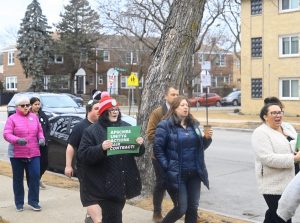Bloggers Left Exposed Via Exclusion From Shield Laws
February 6, 2012
In a recent trial regarding the validity of blogging, a self- titled investigative blogger, Crystal L. Cox, investigating a case regarding an alleged Ponzi scheme, lost her case due to the assertion that “as a blogger with no other credentials, she was not a journalist and was entitled to no protection,” according to PCmag.com.
The judge, recent Obama appointee Marco Hernandez, ordered Cox to pay a $2.5 million fine according to International Sports Examiner Marv Dumon. Hernandez’s ruling cited that while Cox wrote in a factual tone, the fact that she had no affiliation with any established media group i. e. a newspaper, broadcast network, or magazine, the validity of her claims were not protected under shield laws, or reporter’s privilege. In her blog, Cox refers to plaintiff, Kevin Padrick, of Obsidian Finance LLC, as a “thief,” “liar” and “a thug. ”
The suggested fine line between blogging and journalism is examined by Press Think writer Jay Rosen who states, “bloggers and journalists are each other’s ideal ‘other. ‘” In his article, “The Twisted Psychology of Bloggers vs. Journalists:
My Talk at South By Southwest,” Rosen claims that the idea of bloggers “replacing” journalists is one-sided. This “fantasy of replacement comes almost exclusively from the journalist’s side,” Rosen said.
Rosen feels that journalists may be battling for their jobs; their typical adversary being “socially inadequate, pimpled, single, slightly seedy, bald, cauliflower-nosed young men sitting in their mother’s basements and ranting. ” Although this fear, according to Rosen, is “typically connected to fears for a lost business model,” Rosen still feels that journalists ought not to be threatened by the existence of bloggers.
This notion relates to the fact that bloggers vastly outnumber professional journalists, thus inferring the strong influence they may have on delivering news to the public without having been vetted by a news organization charged with and known for providing information to the public.
Chicago Tribune Columnist John Kass says the general public doesn’t appreciate the work that journalists do. “[Our] reporters work in difficult and sometimes dangerous
conditions. They do not blog from mommy’s basement, cutting and pasting what others have reported, while putting it under a cute pen name on the Internet. ” To Kass, not only does the objectivity of journalism the demarcate the distinction between the blogger and the journalist, but the methods of obtaining information exceeds those methods utilized by bloggers.
Although the increase of blogs might suggest a job security threat to many journalists, owing to bloggers’ contemporary and often unverifiable approach to presenting news to the public, Rosen feels confident that real journalism will never fade away. “Blogging cannot replace the watchdog journalism that keeps a government accountable to its people. Journalists know that, but somehow the American people don’t. ”
While many people may no longer be able to distinguish between blogs that use officious layouts and actual vetted news sources, the current legal precedent makes the distinction all too clear.
Published: Monday, February 6, 2012
Updated: Tuesday, February 7, 2012 02:02









